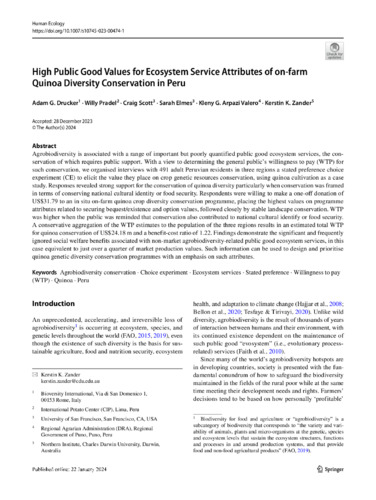High public good values for ecosystem service attributes of on-farm quinoa diversity conservation in Peru
Agrobiodiversity is associated with a range of important but poorly quantified public good ecosystem services, the conservation of which requires public support. With a view to determining the general public’s willingness to pay (WTP) for such conservation, we organised interviews with 491 adult Peruvian residents in three regions a stated preference choice experiment (CE) to elicit the value they place on crop genetic resources conservation, using quinoa cultivation as a case study. Responses revealed strong support for the conservation of quinoa diversity particularly when conservation was framed in terms of conserving national cultural identity or food security. Respondents were willing to make a one-off donation of US$31.79 to an in situ on-farm quinoa crop diversity conservation programme, placing the highest values on programme attributes related to securing bequest/existence and option values, followed closely by stable landscape conservation. WTP was higher when the public was reminded that conservation also contributed to national cultural identify or food security. A conservative aggregation of the WTP estimates to the population of the three regions results in an estimated total WTP for quinoa conservation of US$24.18 m and a benefit-cost ratio of 1.22. Findings demonstrate the significant and frequently ignored social welfare benefits associated with non-market agrobiodiversity-related public good ecosystem services, in this case equivalent to just over a quarter of market production values. Such information can be used to design and prioritise quinoa genetic diversity conservation programmes with an emphasis on such attributes.

